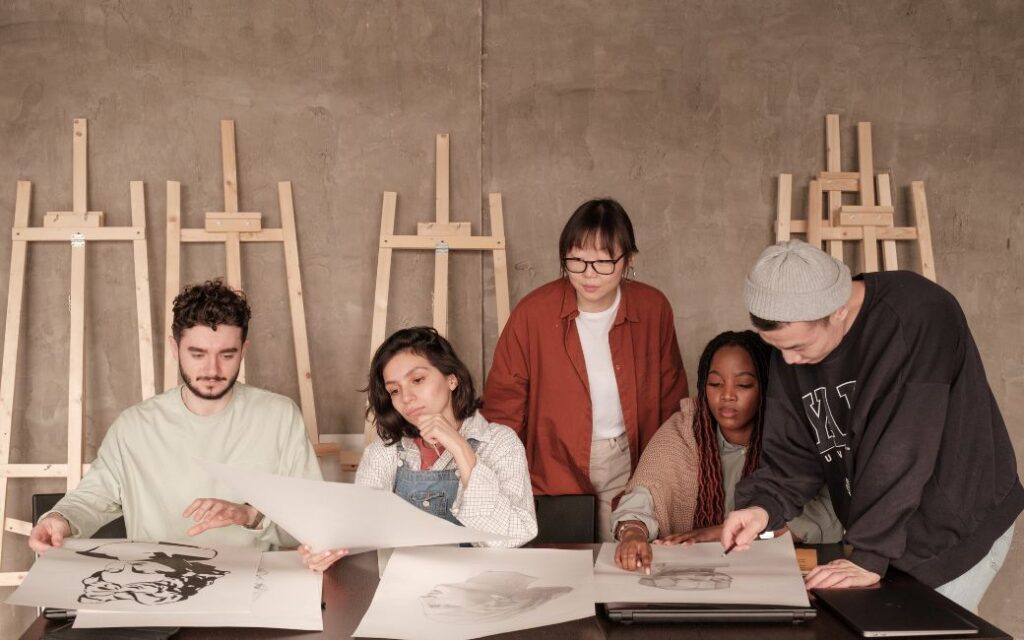Expressive Arts Therapy
One of the treatments offered at Royal Life Centers is expressive arts therapy. Through the use of creative self-expression and multi-mediums, our guests can explore their emotions and thoughts, develop self-awareness, gain a better understanding of themselves, foster insight into their own recovery process, and increase their inner motivation to change their behaviors in treatment and recovery.

What Is Expressive Arts Therapy?
Expressive arts therapy, also known as art therapy, is a hands-on form of therapy that uses creative expression to help people in their recovery. It has been proven effective in treating addiction and can also address mental health issues often linked to addiction, like depression, bipolar disorder, anxiety, PTSD, OCD, and eating disorders.
Unlike traditional talk therapy, art therapy allows individuals to express their feelings in a sensory way. Some people find it challenging to talk openly in a group or individual therapy setting. Expressive arts therapy helps by bringing out unconscious pain and unresolved feelings through the process of creating art. Once these thoughts and memories come to the surface, individuals become more aware of the trauma, making it easier to work with therapists to address and overcome the bottled-up pain.
Creating a safe and welcoming space is crucial in expressive arts therapy. Individuals should feel like they are expressing themselves creatively rather than just attending a therapy session. When the right environment is established, people are more likely to relax and open up, contributing to the process of recovery.
Some different types of expressive arts therapy include:
- Art Therapy
- Music Therapy
- Dance/Movement Therapy
- Writing Therapy
- Mindfulness Meditation
Expressive Arts Therapy offers a holistic and creative approach to address the complex and multifaceted aspects of addiction and mental health issues. It recognizes the therapeutic value of artistic expression in promoting healing, self-discovery, and positive change.
Art Therapy
Art therapy can play an important role in the healing process by providing a means for self-expression and reflection, which can be an invaluable tool in understanding the causes of addiction and how to better cope with them. For instance, art allows for creative problem-solving that can help the individual develop healthier coping skills in order to prevent relapse from occurring. By utilizing creativity to express emotions in an environment free from judgment or criticism, our guests can explore their feelings more freely and find relief and healing. Art therapy can also help to reduce stress, anxiety, and depression, all of which can contribute to addiction.
Art therapy is helpful in healing because it lets people express themselves and think about things. This is important in understanding why addiction happens and how to deal with it. For example, being creative through art helps find solutions to problems and develop better ways to handle tough situations, preventing a relapse.
In a non-judgmental and supportive environment, our guests can use art to freely explore their feelings and find relief. Art therapy is also good for reducing stress, anxiety, and depression, which are factors that can lead to addiction.
Music Therapy
Music therapy helps people of all ages facing challenges, whether physical, mental, social, or emotional. It enhances life quality by aiding communication, relaxation, and exploration. In music therapy, individuals can sing familiar songs, create their own music, play instruments, and dance. Specially trained music therapists use music intentionally to meet individual needs. In our treatment, music therapy activities include improvisation, analyzing lyrics, playing instruments, songwriting, and learning new music.
Our outpatient programs, especially with our in-house recording studios called Sober Studios, offer music therapy. These studios let participants express themselves creatively, similar to traditional art.
Dance/Movement Therapy
Expressive dance and movement therapies help connect the mind and body for overall well-being. For instance, movement therapy is excellent for releasing stress or anger in a healthy way. Trained counselors teach guests dance and movement techniques, promoting non-verbal communication. In these sessions, guests learn to express themselves through body movements instead of just words.
Movement therapies help individuals face fears and handle emotions better. Addiction counselors use movement therapy to boost self-esteem, fostering a positive connection between the mind, body, and soul.
Dance/movement therapy not only enhances physical skills like coordination but also encourages mindfulness of breath, posture, and body awareness.
Writing Therapy
Some people may think they’re not artistic and feel uneasy trying expressive art. However, writing and journaling are personal activities that anyone, even those without creative backgrounds, can find comfortable. Writing therapy can bring emotional relief when you’re overwhelmed and bring calmness to your mind, no matter your mood. For example, prompts for a gratitude journal and positive affirmations can shift your mindset towards a more positive outlook.
Taking time to write about your thoughts and experiences can provide clarity and show your progress in recovery. Mindfulness journaling helps you reflect objectively on your life, aiding in understanding and processing past painful events.
How Does Expressive Arts Therapy Work?
Expressive arts therapists use fun activities and creative things to help people understand and express feelings that are hard to put into words. Doing things that bring out creativity and let people express themselves can be a healing and growth tool.
According to Cathy Malchiodi, a specialist in Trauma and Expressive Arts Therapy, expressive arts therapy has four main parts:
Movement: Involves physical activities to express emotions through motion.
Sound: Uses music to regulate emotions and release tension.
Storytelling: Engages the mind by creating written narratives, helping people rethink their experiences.
Silence: Provides space for inner peace and connection with meditative therapy.
Each part helps in healing from addiction. For example, movement uses touch to express emotions physically, sound uses music to control feelings, storytelling lets the mind be creative with written stories, and silence creates space for peace and connection.
By doing creative activities that involve these four parts, people in therapy can understand their behavior and the reasons behind their addiction. Expressive arts therapy is especially helpful because it allows individuals to work through tough issues, like trauma or fear, that may be challenging to talk about.
Have any questions?
What Are the Benefits of Expressive Arts Therapy?
Expressive arts therapy is valuable because it goes beyond regular talking therapy. It lets people express themselves through creative activities like painting, drawing, writing, sculpting, dancing, and making music.
Some of the benefits of expressive arts therapy include:
- Promote self-exploration and mindfulness
- Rebuild strength and physical health
- Improve cognitive functioning
- Enhance emotional resilience
- Establish healthy communication
Expressive arts therapy involves expressing yourself and using practical skills for coping and relaxation. Doing these activities naturally helps people gain confidence, handle emotions, and find meaning in tough events.
Self-Exploration and Mindfulness
People in recovery should find creative ways to explore and understand themselves. Using expressive arts therapy helps them see the power of their own story and understand their feelings better.
Expressive arts therapy also helps individuals figure out important values, allowing them to live a more meaningful life. This helps guests become more self-aware and connected as they try various creative expressions.
Rebuild Strength and Physical Health
Expressive arts therapy aids people in recovery by restoring their physical strength and healing the body from addiction’s effects. Activities like dance and yoga teach physical relaxation techniques, building muscles and easing stress.
These activities not only fulfill the CDC’s daily movement recommendation but also boost energy, lessen pain, enhance body awareness, improve motor skills, promote relaxation, and contribute to better sleep.
Improve Cognitive Functioning
Being creative helps people express thoughts and feelings constructively, improving cognitive functioning. Creative projects, like drawing, painting, and writing, enhance focus and concentration by offering an engaging outlet for ideas. These activities stimulate attention span and impulse control, serving as a great way to exercise mental agility, problem-solving skills, and acquire knowledge.
Enhance Emotional Resilience
Creative activities help individuals boost self-esteem and emotional resilience. Making art provides insight into one’s thoughts and feelings, fostering better self-understanding. Artistic expression serves as a safe way to convey anger or sadness without resorting to harmful actions.
Participating in this therapy helps individuals find effective ways to deal with stress and emotional triggers. Consequently, guests develop the skills to manage emotions, make healthier choices, and become more resilient to life’s challenges.
Establish Healthy Communication
This therapy is great for people who struggle to talk about their feelings. It helps them explore deeper aspects of themselves with less fear and anxiety. Instead of just talking, clients can use creative expression to break down barriers and share important parts of their stories. Making art or performing allows clients to express themselves in ways that feel more comfortable and real.
Participating in this therapy helps individuals find effective ways to deal with stress and emotional triggers. Consequently, guests develop the skills to manage emotions, make healthier choices, and become more resilient to life’s challenges.
What To Expect During Expressive Arts Therapy?
Expressive activity therapy is a proven method for treating addiction and mental health issues. It provides a safe space for dialogue, often without using words. This type of therapy is great for those in recovery who might feel unsure about starting the next stage of mental healing.
In expressive arts therapy, counselors encourage people who have experienced pain to be open and expressive, even when they might want to keep to themselves. Creative activities gently help you stay open through the use of artistic expression.
This therapy helps individuals tap into a childlike desire to create. Even if people don’t realize it at first, expressing themselves creatively brings a wonderfully positive feeling of creativity and community. Through this, you can feel liberated, fostering a sense of acceptance and support.
Expressive Arts Therapy at Royal Life Centers
At Royal Life Centers, we offer a wide range of traditional therapies as well as art therapy, music therapy, writing and journaling therapy, and movement therapy. These expressive arts therapies promote our biopsychosocial-spiritual model of recovery, focusing equally on your mind, body, and spirit. If you would like to learn more about any of our person-centered expressive arts therapy programs, please reach out today. Our team of addiction recovery specialists is here to walk you through every step of your sobriety journey.
Looking for Arts Therapy in Rehab?
If you or someone you love is struggling with addiction, please reach out to us to find out more about how our art therapy services can help. We work with most private insurance policies and offer affordable self-pay rates if you do not have insurance. Give us a call and we will figure out the best treatment plan for you or your loved one.
Because We Care.

Would you like more information?
If you or someone you know has a substance use disorder, we hope you’ll begin your journey with us at Royal Life Centers.


















